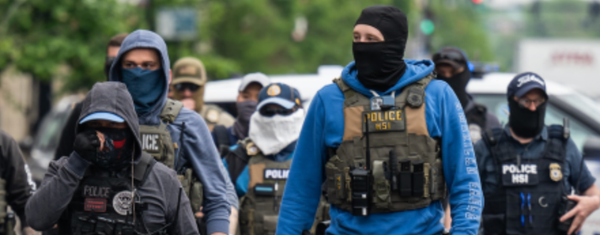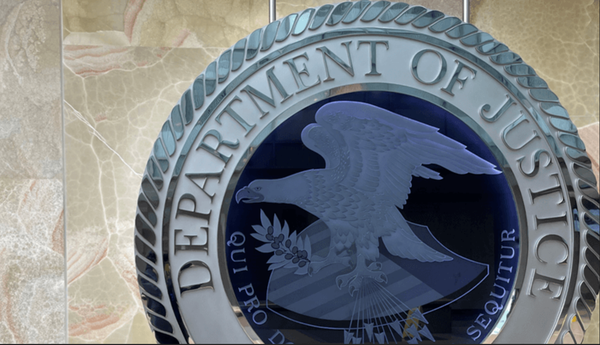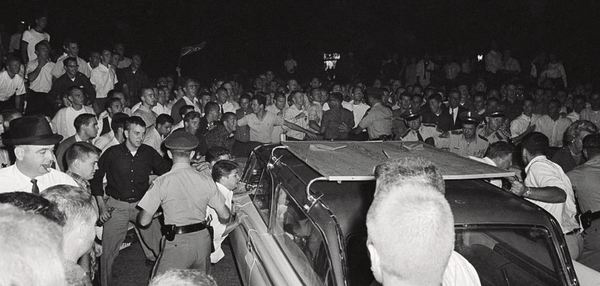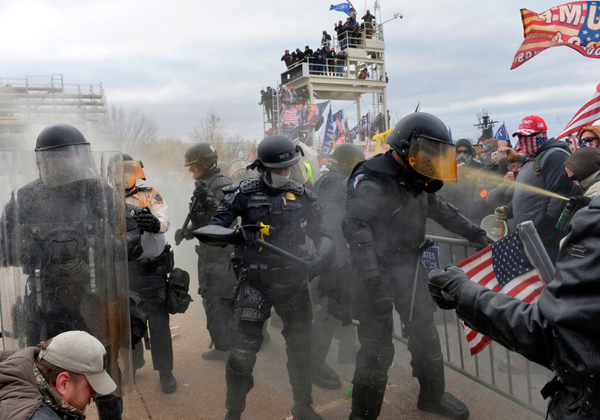Thieving, On a Jet Plane
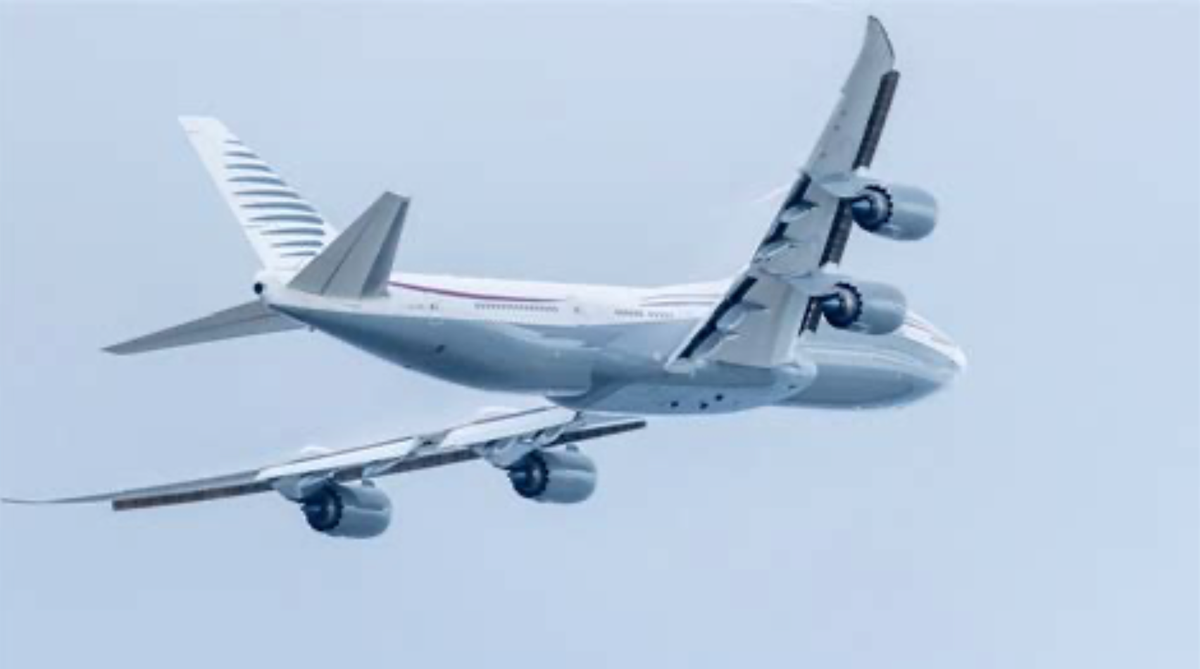
Even more so than his exhausting first term, the second term of President Donald J. Trump has been a seemingly endless onslaught of outrages. There's so much incompetence, so much stupidity, so much criminality going on at any one moment that it's hard to think straight. It's more of a shambolic "shock and awful" approach than a masterful "shock and awe" wave, but the practical result is the same. We're overwhelmed.
But every now and then, revelations line up in a way that brings one of Trump's countless problems into focus.
Just this week, for instance, we learned that Qatar was sending the president a $400 million luxury jet described as a "palace in the sky." Under the terms of the corrupt bargain, the president would be able to use the jet as a new Air Force One and then keep it as his library's possession (wink wink) after leaving office.
The offer is ludicrous on its face, of course. For starters, the security concerns alone should nix this deal. We're a nation that sends its own helicopters along with the president when he travels to foreign countries, because we don't trust other nations for that. Air Force One is much more important, and it's insane to think we'd take an aircraft constructed by another country for that purpose – needless to say, a country that's a major sponsor of Hamas and the Muslim Brotherhood, too.
But even if we leave aside the security concerns (seriously, Secret Service – feel free!) the simple size of the gift has sparked a long-overdue discussion about the many ways in which Donald J. Trump has been violating the clear language of the Constitution, which bars a president from benefiting financially from office in no uncertain terms.
How did we get here?
It's worth stepping back to remember that at the start of Trump's first term, there were at least some half-hearted attempts to pretend that he had no connections to his business interests anymore and that he would not actually be enriching himself while in office.
There were countless pieces after his upset win over Hillary Clinton promising that he was going to turn his business operations completely over to his idiot sons, for instance. We get regular stories these days about how those same business operations are directly lining his pockets, but we should remember that once upon a time even the Trump family felt the need to pretend that wasn't going to happen.
It was obviously a lie from the start, though, and the Trump syndicate quickly found ways to push against the bounds of the law. It began with foreign powers pretty openly bribing Trump through extended stays at his Washington hotel or his other branded properties, and continued through the sweetheart deals that his children constantly managed to land, thanks solely to their personal brilliance and hard work.
The Trump family was committed to the grift in his first term, but in the second they're apparently aiming for cartoonish levels of corruption. A recent piece in the New York Times offered a thorough account of Trump's inconceivably broad set of financial conflicts, compromises and outright bribes and, even though the language is typically mealy-mouthed, the Times' breakdown of the details is jaw dropping. (Gift link there.)
Again, it is staggering just how far we've fallen down the corruption hole here.
The change from Trump's first term is remarkable, but we should be comparing Trump to the other presidents who came before him. As is often the case, The Onion captured the moment perfectly with this piece from January 2017:
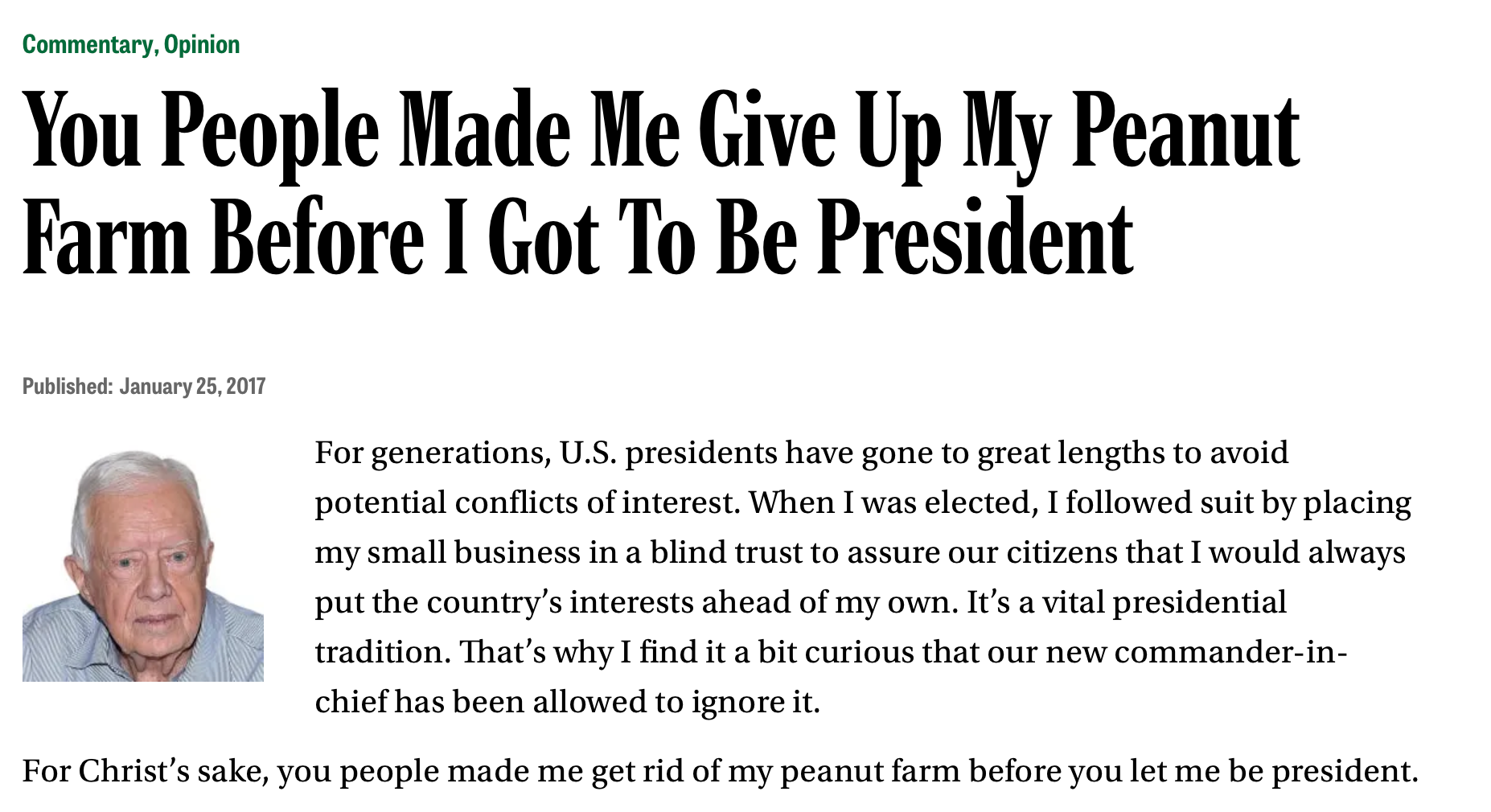
In reality, the contrast between Carter and Trump on this vital issue is even more ludicrous than The Onion suggested.
Carter didn't simply give up his interest in his family peanut farm and warehouse before assuming the presidency. He spent a good deal of his time in office answering questions about his former business practices even after he cut ties.
I wrote a bit about this in the chapter I wrote on Carter for the updated edition of the Presidential Misconduct collection that prominent historians first crafted to place Richard Nixon's crimes in context and then continued to do the same for Trump.
I want to share some of that piece because I don't think most Americans appreciate just how far Carter went to assure Americans that he was clean on this vital issue, and just how far we've strayed from what was once a widely-accepted norm.
From the start, Jimmy Carter presented himself as an “outsider.”
Though he had relatively little government experience for a presidential candidate—just four years in Georgia’s state senate and four more as its Governor—Carter turned his thin résumé into an asset. His total lack of involvement in national government, he argued, meant that he was untainted by it, too. When he announced his presidential campaign in December 1974, the long-shot candidate emphasized that he was much more than a politician. Presenting his role in government as just one of his identities, he introduced himself to the nation as “a farmer, an engineer, a businessman, a planner, a scientist, a governor, and a Christian.” And in the years that followed, Carter downplayed his past in politics. Instead, he emphasized his simple roots in the rural South of Plains, Georgia, where his family ran a peanut farm and warehouse and he served as a Baptist Sunday school teacher.[1]
Distancing himself from Washington D.C., Carter presented himself as the antithesis of its political culture of cronyism and corruption. This “outsider” trope became more common in the wake of the Watergate crisis of the Nixon administration, but Carter laid an early claim to the territory. “The strongest feeling in this country today,” an adviser noted in a 1972 memorandum, “is the general distrust of government and politicians at all levels. The desire and thrust for strong moral leadership was not satisfied with the election of Richard Nixon.”[2] Accordingly, Carter worked to associate himself with the values of trust, honesty, integrity, and responsibility. “I will never make a misleading statement,” he promised voters. “I will never tell a lie or avoid a controversy. I will never let you down.”[3]
After he won the presidency, Carter immediately worked to make his promises manifest. In January 1977, he announced that he was placing his interest in his family’s farm and peanut warehouse into a blind trust. Moreover, the President-elect made it clear that he expected everyone in his administration to follow his personal example. The Carter White House soon instituted stricter rules for financial disclosures and conflicts of interest and worked to curb the practice of “revolving-door” government, in which officials left office and then went to work for businesses in the industries they had dealt with in their government roles. The new ethics rules, Press Secretary Jody Powell explained, were meant “to restore the confidence of the American people in their own government.”[4] .....
Upon taking office, Carter had placed his share of the family-owned peanut warehouse—62 percent—in a blind trust under the control of Atlanta lawyer Charles H. Kirbo. The remainder was maintained by Carter’s mother Lillian and his younger brother Billy (as he was commonly called), who oversaw daily operations. Over the course of 1977, the business fell on hard times, partially due to an unwise expansion of operations and partially due to a drought that hurt local crops. The President’s blind trust lost more than $300,000 during that period, and Kirbo soon announced that he was looking to sell the warehouse entirely.[11]
The attention to the failing family enterprise brought to the surface details about past mismanagement of the warehouse and concerns about possible misappropriation of funds. In November 1978, newspapers reported that the National Bank of Georgia, under Bert Lance’s direction, had lent Carter’s Warehouse $1 million without full collateral. Further inquiries in January 1979 revealed that Lance had also, in early 1976, directed bank officials to lower interest rates on loans and lines of credit to Carter’s Warehouse totaling nearly $4 million in all. While the issuing of the loans came under scrutiny, so did the terms of their repayment. In March 1979, a former bonded warehouseman who was employed by NBG to supervise the collateral on the warehouse loan reported that, at Billy Carter’s direction, he had sent misleading reports to the bank. It soon became clear that the warehouse was roughly $500,000 behind in its repayment schedule.[12]
Though the President had divested himself from the business, these reports raised questions about his possible role in securing the loan and, soon, questions about whether any money from the loan had been diverted to his 1976 presidential campaign. On March 20, 1979, with pressure for a full investigation mounting, Attorney General Griffin Bell appointed former U.S. Attorney Paul J. Curran, a New York Republican, to serve as Special Counsel to investigate the loans. (Initially, Curran’s powers fell short of those of a special prosecutor as outlined in the recently passed Ethics in Government Act of 1978, the post-Watergate legislation that instituted new policies and procedures for investigations of the executive branch. Under pressure from Republicans in Congress, Bell expanded Curran’s authority and effectively made him a special prosecutor in everything but name.)[13]
The Special Counsel’s investigation unfolded over seven months during the summer of 1979. “I want to do the investigation as quickly as possible,” Curran told reporters, “but obviously it has to be thorough.” The Special Counsel’s legal team reviewed 80,000 documents and took grand jury testimony from 64 witnesses, including Billy Carter. Most significantly, President Carter himself provided a sworn deposition in an interview that lasted four hours, marking the first time in American history that a sitting president was interviewed under oath in a criminal investigation. “Curran is looking for the smoking peanut, if there is one,” a reporter for the Atlanta Constitution noted, “and if there isn’t, he wants to be very sure.”[14]
In October 1979, the Special Counsel issued his findings in a 179-page public report. Curran concluded that there was no evidence that any money had been diverted from Carter’s Warehouse to the Carter presidential campaign. Moreover, he declared that, while he was not “exonerating” Billy Carter, he had found no grounds for federal criminal charges over the handling of the NBG loans at the warehouse either. Asked how it felt to be declared “clean,” the President responded: “I knew it all the time.”[15]
Listen, I know it's not the most gripping story I've ever written, but the basic boring facts of it should give us all serious pause.
Jimmy Carter completely severed all his ties with his family business in order to serve as president. And when questions arose about his prior dealings there, the president readily opened the books to investigators and even sat for a four-hour sworn deposition. He knew the American people demanded nothing less than complete transparency.
So what's changed? Part of it is the simple brazenness of Donald Trump, who's proved willing to flout norms and break laws here. And part of the blame lies with his enablers in the Republican-led Congress and Republican-led Supreme Court, which have both encouraged his grifting and greed and so much more.
But ultimately the blame lies with us. Our political system, however flawed, is a reflection of our will. The collective shrug that the American people gave to Trump maintaining his grubby little "empire" of crappy properties and crappier products during his first term set the stage for the brazen bribery of his second term.
We have to demand better. From our president, from our congresspeople, and from ourselves. And at moments like this – when even voices on the far right are raising objections – it's our duty.
[1] Stuart E. Eizenstadt, President Carter: The White House Years (New York: Thomas Dunne Books, 2018): 48; James T. Wooten, “Carter Bids ‘Men of Faith’ Take Greater Public Role,” New York Times, June 20,1976; James P. Gannon, “Carter’s Character,” Wall Street Journal, July 12, 1976.
[2] Burton I. Kaufman, The Presidency of James Earl Carter, Jr. (Lawrence: University Press of Kansas, 1993): 13.
[3] Curtis Wilkie, “Democrats Have a Front Runner,” Boston Globe, February 26, 1976.
[4] David S. Broder, “Ethics Code Is Outlined by Carter,” Washington Post, January 5, 1977; Aldo Beckman, “Carter Discloses Ethics Guidelines for Self, Aides,” Chicago Tribune, January 5, 1977.
...
[11] Robert Lezner, “Carter Peanut Business Faces a Slump This Year,” Boston Globe, October 8, 1977; “Peanuts a Pain to Carter,” Newsday, November 7, 1977; “Carter’s Blind Trust Had Loss Last Year Totaling $306,271,” Wall Street Journal, June 16, 1978.
[12] Jeff Gerth, “Lance Bank Lent Carter Business $1 Million Without Full Collateral,” New York Times, November 19, 1978; Nicholas M. Horrock, “Lance Told Bank to Cut Loans for Carter Concern, Audit Reports,” New York Times, January 18, 1979; Ted Gup and John F. Berry, “Carter Warehouse Loan Scheme in ’76 is Alleged,” Washington Post, March 11, 1979; Nicholas M. Horrock, “Former Carter Warehouseman Says He Sent Misleading Data to Bank,” New York Times, March 19, 1979.
[13] Nicholas M. Horrock, “Bell Names Former U.S. Attorney to Investigate Carter Peanut Loans,” New York Times, March 21, 1979; Patrick J. Sloyan and Anthony Marro, “The Peanut Probe,” Newsday, April 1, 1979; “Carter Loan Probe Gets ‘Special’ Chief,” Chicago Tribune, March 21, 1979; Wendell Rawls, Jr., “Bell Increases Curran’s Authority to Examine Carter Business Loans,” New York Times, March 24, 1979.
[14] Nicholas M. Horrock, “Billy Carter Says Peanut Money Wasn’t Diverted to ’76 Campaign,” New York Times, May 19, 1979; Anthony Marro, “Carters Cleared in Probe of Family Peanut Farm,” Newsday, October 17, 1979; Margaret Shannon, “Paul Curran and the Peanut,” Atlanta Constitution, July 8, 1979.
[15]Marro, “Carters Cleared in Probe of Family Peanut Farm”; John F. Berry and Ted Gup, “Inquiry Clears Carter Family’s Peanut Business,” Washington Post, October 17, 1979.
[16] Kaufman, The Presidency of James Earl Carter, Jr., 136; Bill Montgomery, “Billy, Like Beer, May Become Stale,” Atlanta Constitution, January 14, 1979.
[17] “Billy Carter, Georgians Visit Libya,” Baltimore Sun, September 30, 1978; “No Beer for Billy on Libyan Visit,” Washington Post, September 29, 1978.
[18] Carol Ashkinate, “Billy Carter Invites 400 to Bash for Libyans,” Atlanta Constitution, January 9, 1979; Norman Kempster, “Billy Carter’s Bid to Help Libyans Fails,” Los Angeles Times, January 11, 1979; Kaufman, The Presidency of James Earl Carter, Jr., 136–137; “Relieving Himself in Public Latest Billy Carter Caper,” Hartford Courant, January 13, 1979; Montgomery, “Billy, Like Beer, May Become Stale.”
[19] Bill Shipp, “Is Billy Working for KGB or GOP?” Atlanta Constitution, January 10, 1979; “White House Disavows Billy Carter’s Libya Views,” Los Angeles Times, January 11, 1979; Martin Schram, “Billy Is a Real Pain, Carter Finally Says,” Atlanta Constitution, February 25, 1979; Ted Thackery, Jr., “Billy Carter in Alcoholic Unit,” Los Angeles Times, March 7, 1979.
[20] Zelizer, Jimmy Carter, 108–109; Robert G. Kaiser and Edward Walsh, “Billy Carter Used by Brzezinski as Libya Go-Between,” Washington Post, July 23, 1980; “Billy Carter and the Libyans—From the 1978 Beginning,” Boston Globe, July 25, 1980; William Safire, “None Dare Call It Billygate,” New York Times, July 21, 1980.
[21] John H. Averill and Robert L. Jackson, “Senate Votes to Probe Billy Carter Affair,” Los Angeles Times, July 25, 1980; Jack Nelson, “Carter Seeks to Speed Up Senate Probe,” Los Angeles Times, July 30, 1980; “President Releases Libya Cables; Senate Sets Probe Hearings,” Hartford Courant, August 1, 1980; “Text of Carter’s Report to Senate on His Actions on Brother’s Ties With Libya,” New York Times, August 5, 1980; “Carter Defends White House Stand on Brother’s Links With Libyans,” Wall Street Journal, August 5, 1980.
[22] David E. Rosenbaum, “Senate Unit Assails President and Aides in Billy Carter Case,” New York Times, October 3, 1980.
<Endnotes>
